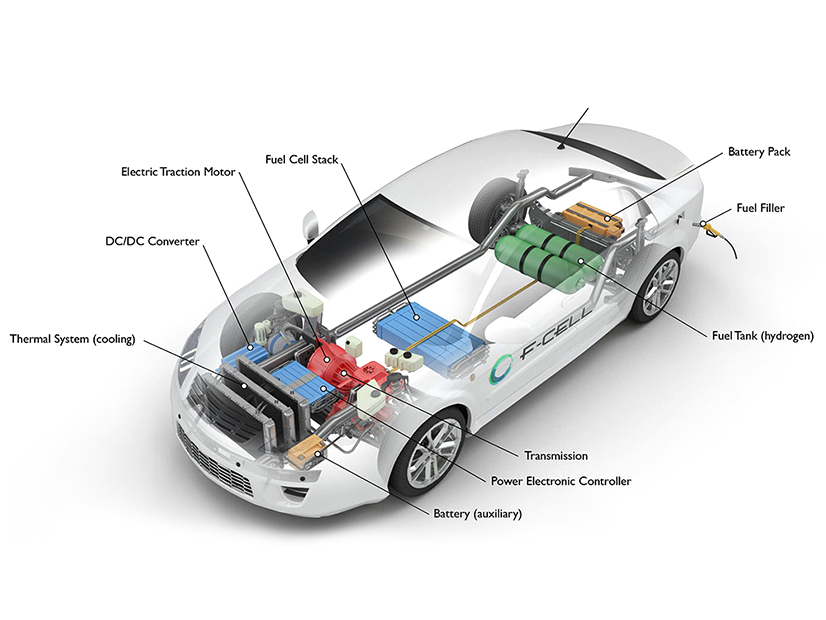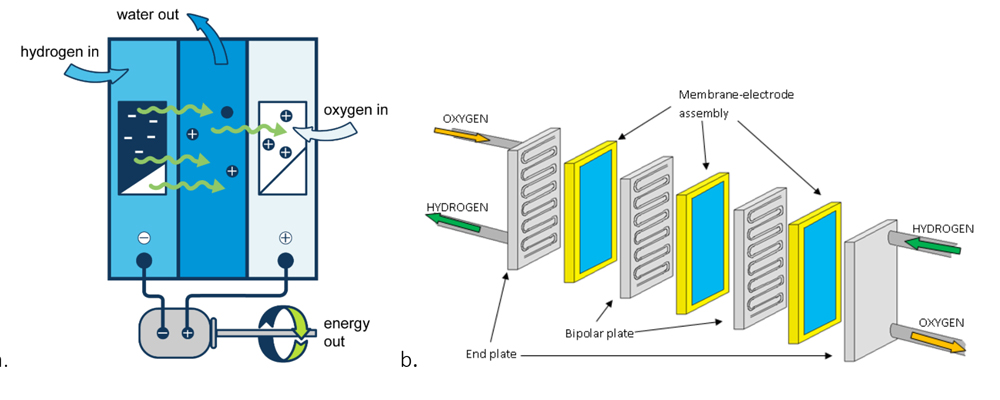Fuel cell technology could play a “critical role” in New Jersey’s drive to reach 100% clean energy, according to a state report released Aug. 8 that cited the energy source’s potential use in transportation, supplementing the state’s growing wind and solar sectors and acting as an emergency backup energy source.
The report by the New Jersey Fuel Cell Task Force, which Gov. Phil Murphy (D) created, outlines 21 recommendations on how the state should position itself to reap the benefits. It adds that the state is well positioned for such a move because of its high concentration of engineers and scientists, the network of research universities present and the “numerous industrial and chemical plants that could be used to generate hydrogen.”
Fuel cells have “the potential to reduce greenhouse gas emissions and harmful air pollutants and expand the state’s diverse clean energy portfolio,” the report says, echoing Murphy.
Fuel cells use hydrogen or other fuels to generate electricity, producing only water and heat as byproducts and emitting no greenhouse gases. In April, New Jersey and seven other states submitted a proposal seeking $1.25 billion from the U.S. Department of Energy to create a Northeast Regional Hydrogen Hub. (See Maine, RI Join Multistate Hydrogen Agreement.)
President Joe Biden authorized the hydrogen hub grants in the $1.2 trillion Infrastructure Investment and Jobs Act signed into law in November 2021. It provides $8 billion for four regional hydrogen hubs, $1 billion for research to bring down the cost of hydrogen electrolysis and $500 million to support equipment manufacturing.
Hub Proposal
Murphy created the task force to promote the use of cells in the state, and the body’s recommendations, according to the report, are designed to “create momentum in advancing fuel cells and hydrogen within the state and strengthen New Jersey’s hub proposal.”
Fuel cell electric vehicles (FCEVs) could be a key use of the technology, especially for medium- and heavy-duty vehicles, for which the battery weight, limited range and relatively long recharge time make battery power less viable, the report says. For similar reasons, technology could be extremely useful for buses, rail, marine vessels and material-handling equipment, the report says. (See Will Hydrogen Fuel Cell Vehicles Beat out Battery Electric?)
The faster fueling time of fuel cells, in particular, is a benefit, the report says. An FCEV can be filled up in about the same time as it takes to refuel a diesel engine, offering a timelier option than an electric battery, which can take hours to refuel depending on the strength of the charger, the report says.
“The state is also home to many large warehouses where fuel cell-powered material-handling equipment offers significant advantages over diesel or battery power in terms of emissions, productivity and lifecycle costs,” the report says.
The report’s other suggestions on how the state should strengthen its ability to take advantage of fuel cell technology include:
-
- Explore ways to incentivize technology to improve local air quality;
- Explore fuel cells as a non-combustion option for demand response programs, which provide alternate energy sources when high demand stretches the available electricity supply;
- Consider options for state tax credits on investments or production of low-carbon hydrogen;
- Encourage revisions in PJM’s tariff to include green hydrogen production;
- Consider requiring electric distribution companies to propose state electricity resilience tariffs to help fund system strengthening measures;
- Focus the Board of Public Utilities’ grid modernization program on valuing desired environmental attributes for distributed energy resources;
- Spur FCEV adoption through incentives, bills, programs and tax credits;
- Engage private sector industry partners to develop fuel cell and hydrogen-related pilot projects in New Jersey; and
- Engage a broad hydrogen and fuel cell technology education, training and workforce development program.
Dispatchable Electric Supply
The report also sees the ability of fuel cells to turn on and off as a potentially useful source of dispatchable electric supply. That would help, for example, with “peak shaving,” offering a secondary energy supply to help handle peak demand periods and providing a supplement to intermittent sources, such as wind and solar, according to the report.
“The revenue that fuel cells receive for their value to the grid could be used as an incentive to promote their use as a replacement for diesel-powered emergency generators,” the report says. In addition, “less efficient peak load serving units create what is known as locational marginal emissions during peak load events; fuel cells directly offset these marginal emissions.”
Fuel cells also could be a source of backup power to the state, providing reliability and resilience, especially in situations in which natural disasters knock out power from the grid and can complement or provide a substitute to battery-based storage, the report says.
“Examples of fuel cells and hydrogen for backup power include small scale backup power (less than 100 kW), long-duration energy storage, microgrids and utilities,” the report says.




